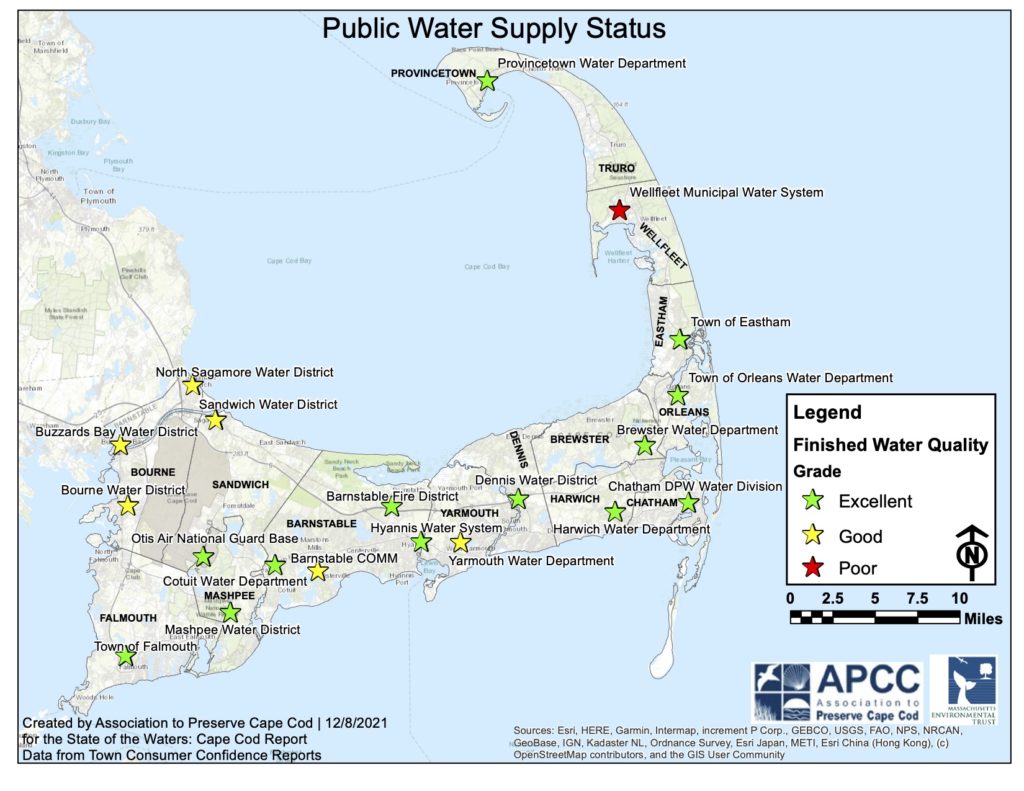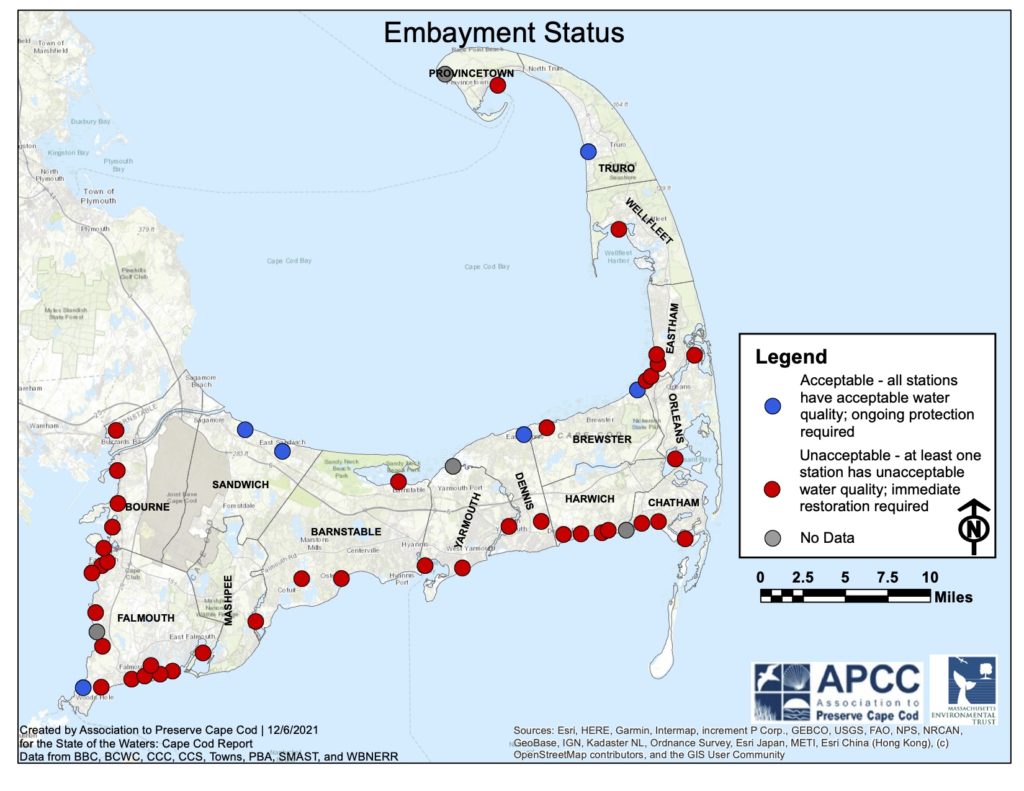The water quality of the Cape’s freshwater ponds and coastal estuaries have continued to decline, according to the third annual “State of the Waters: Cape Cod Report” from the Association to Preserve Cape Cod.
The third annual report shows continued degradation of coastal embayment and freshwater pond water quality as well as lower grades for public drinking water quality in some Cape towns.
Along with the release of the report findings, APCC made recommendations for immediate actions to take to address the Cape’s water quality concerns, including encouraging towns to take advantage of new funding opportunities at the local, state and federal levels for wastewater infrastructure as well as calling for implementation in 2022 of the Cape Cod Commission’s proposal for a water quality study for freshwater ponds comparable to the 208 study conducted for coastal embayments.
The State of the Waters report is a yearly comprehensive assessment by APCC of the quality of the Cape’s coastal embayments, freshwater ponds and public water supplies. The purpose of the report is to generate awareness of the Cape’s overall water quality and to advocate for action by policy makers to adopt water quality improvement measures, according to APCC.
Over the past three years, the study has shown a consistent pattern of poor water quality in many of the Cape’s coastal embayments and freshwater ponds due to the impact of excessive nutrients on the region’s water resources, according to the findings of the report. The greatest source of nutrients impacting embayments and ponds is from inadequately treated wastewater from septic systems. Stormwater runoff and fertilizers are additional sources of nutrients impacting the Cape’s waterbodies.
Water Supply Grades
In a departure from the past two years, the 2021 report revealed several examples of town public water supplies that fell below acceptable water quality standards in 2020. While 13 public water suppliers continued to receive excellent scores for water quality, review of 2020 Consumer Confidence Reports prepared by Cape Cod public water suppliers showed seven instances where state and federal water quality standards were not met and, in some cases, required corrective actions.
 The instances ranged from one or two violations amounting to temporary exceedances of the standard for total coliform bacteria in some towns, to several violations of two water quality standards, one for E. coli bacteria and the second for total coliform bacteria, requiring issuance of a boil-water order in Wellfleet.
The instances ranged from one or two violations amounting to temporary exceedances of the standard for total coliform bacteria in some towns, to several violations of two water quality standards, one for E. coli bacteria and the second for total coliform bacteria, requiring issuance of a boil-water order in Wellfleet.
The exceedances of state and federal standards by those Cape towns do not reflect the presence of per- and polyfluoroalkyl substances, or PFAS, recently detected in the drinking water supplies of several Cape towns. Massachusetts standards for regulating PFAS had not yet gone into effect in 2020, the year scored for APCC’s 2021 report.
“The presence of bacteria in some drinking water systems is evidence of the need to continue to invest in water supply infrastructure, as bacteria is good at finding and exploiting the weaknesses in delivery systems,” said Andrew Gottlieb, APCC’s executive director. “Managing and preventing bacteriologic contaminants is as old as the water supply industry, and the vast majority of our suppliers continue to do an excellent job. The exceptions, particularly the one in Wellfleet that resulted in a boil water order, show the importance of professional management and the need to continually invest in water supply systems.”
Coastal Embayment Grades
The 2021 grades for coastal embayments showed an increase in the number and percentage of unacceptable embayments compared to previous years, with three new unacceptable embayments—two on Cape Cod Bay and one on Buzzards Bay. Forty-one embayments were graded as having unacceptable water quality, representing 87 percent of the total. In APCC’s 2020 report, 38 embayments or 79 percent, were unacceptable. In 2019, 32 embayments, or 68 percent, were unacceptable.
 This year, only six of the 47 graded embayments were determined to have acceptable water quality, representing 13 percent of the graded embayments. No embayments moved from an unacceptable to acceptable grade.
This year, only six of the 47 graded embayments were determined to have acceptable water quality, representing 13 percent of the graded embayments. No embayments moved from an unacceptable to acceptable grade.
In the report, APCC encouraged Cape Cod towns to move aggressively in taking advantage of new federal and state funding opportunities for wastewater infrastructure investment. APCC also called on Barnstable County to eliminate interest charges on community septic management financing to provide support to those in need of assistance in upgrading or connecting to sewers.
“Estuarine water quality continues to decline despite important votes in many towns to proceed with the necessary upgrades to wastewater treatment needed to reduce the nutrient pollution impacting our bays,” said Gottlieb. “These projects take time to implement, and with a few limited exceptions, the town wastewater management programs have not yet had an impact on the nutrient levels reaching our estuaries. The residual nitrogen from septic systems is still working its way through the groundwater and is degrading the embayments. This will stop once enough septic systems are removed and estuaries are allowed to heal. Things will continue to get worse while towns build out their collection and treatment systems, but we have good reason to be optimistic with the progress we have seen at the local level,” explained Gottlieb.
Freshwater Pond Grades
Cape Cod ponds continue to be impacted by nutrient pollution. This year, 109 ponds were graded compared to 93 last year, with 38 ponds, or 35 percent, graded as having unacceptable water quality. Seventy-one ponds, or 65 percent, received an acceptable water quality grade. Although the number of ponds studied in the 2021 report increased from previous years, the percentage of ponds with unacceptable water quality in the 2019, 2020 and 2021 State of the Waters reports has remained relatively consistent at approximately one-third of graded ponds.
Grades for a majority of the ponds—73—relied exclusively on APCC’s cyanobacteria monitoring data due to the lack of data from other pond monitoring programs across the Cape. “With nearly a thousand Cape Cod ponds, the small number of ponds where water quality data is available underscores the need to significantly increase the Cape’s freshwater pond monitoring efforts,” said Gottlieb.
In the report, APCC stressed the need to expand pond monitoring across the Cape, particularly for those ponds where there are swimming beaches, public access or sensitive natural resources. APCC also urged the Barnstable County Commissioners and Assembly of Delegates to move forward in 2022 in approving the Cape Cod Commission’s proposed 208 water quality study for ponds similar to what was done for the coastal embayments.
Maps with water quality scores for embayments, ponds and drinking water, along with the full report, action plan, Atlas of Water Restoration Needs and Solutions, and a fact sheet on PFAS, are posted at capecodwaters.org.
The APCC State of the Waters: Cape Cod report is funded by a grant from the Massachusetts Environmental Trust, which is one of the commonwealth’s leading environmental philanthropy organizations and is mainly funded by state environmental license plate revenues.


























